13 Dec2016
By Angela Maynard Sewall
As the fall academic semester ends and we turn to planning and early implementation for the next term, now is a prime time to assess what our programs have accomplished and the scope of work that lies ahead. One way to “self-check” is to consider peers’ approaches as well as expert advice to help inform our work – and a convenient opportunity to do so is presented in the archived webinars in the AACTE Resource Library.
New standards are emerging, states are reassessing their foci and processes in light of the new Elementary and Secondary Education Act, major transitions are pending in the Department of Education and elsewhere, and the call for evaluation of outcomes rather than inputs only increases. These topics and others are among the lessons of recent AACTE webinars.
13 Dec2016
By Jori S. Beck and Rosemary Q. Flores
The views expressed in this post do not necessarily reflect the views of AACTE.
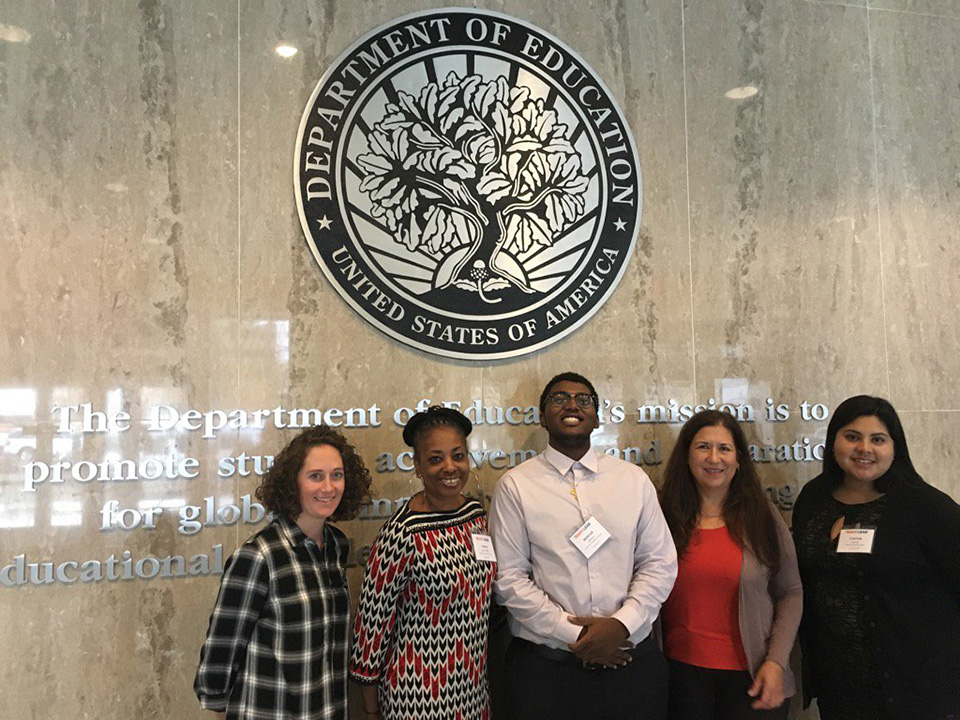
Members of Nevada’s Teach to Lead team at the summit in Washington, DC
We were thrilled to be accepted to participate in the first-ever topical Teach to Lead Summit on Teacher Preparation, held November 2-4 in Washington, DC. Our team worked on a state-funded project that focuses on recruiting high school and undeclared college students of color to education called Abriendo Caminos: Opening Pathways for Students of Color to the Teaching Profession. Our participants included one active teacher, Cynthia Chavez; one undergraduate preservice teacher, Marcus Jackson; a doctoral student and assistant professor, Tonya Walls; and the two of us: Rosemary Q. Flores, a family engagement specialist, and Jori Beck, a teacher preparation representative. The purpose of attending the summit was to further develop our project, and we were provided with ample opportunities from both internal and external critical friends for this work.
13 Dec2016
By Diana Rogers-Adkinson
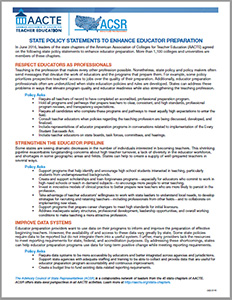
In August, the Advisory Council of State Representatives (ACSR), the governing body of AACTE’s state chapters, released a set of state policy statements to enhance educator preparation. The statements represent the priorities of more than 1,100 educator preparation providers nationwide. AACTE created a customizable template in which state chapters can adapt the statements to meet their state and local needs.
The Missouri Association of Colleges for Teacher Education (MACTE) has been working on tools to advance our message with the state legislature and other key stakeholders. One of our newest assets is the ACSR State Policy Statements, which we adapted by adding a statement on our membership. MACTE has 100% participation among the state’s institutions of higher education that support educator preparation. We felt it was critical to illustrate that we are the collective voice of educator preparation in Missouri.
12 Dec2016
By JTE Insider
Have you seen the JTE Insider blog managed by the Journal of Teacher Education (JTE) editorial team? You’ll find recent podcast interviews with Kevin Kumashiro, discussing how the field has changed since the publication of his 2010 article “Seeing the Bigger Picture: Troubling Movements to End Teacher Education,” and with Noelle Paufler, author of “Preparing Teachers for Educational Renewal Within Current Contexts of Accountability: Reflecting Upon John Goodlad’s Twenty Postulates.” Meanwhile, check out the latest author interview below.
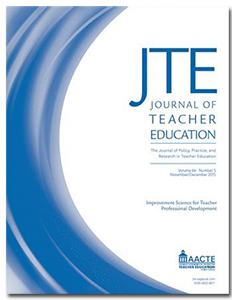
This interview features insights from the JTE article “Riding la Bestiá: Preservice Teachers’ Responses to Documentary Counter-Stories of U.S. Immigration,” written by Lisa Brown Buchanan (LBB) and Jeremy Hilburn (JH). You can find this article in the November/December of JTE through this link.
08 Dec2016
By Zachary VanHouten
Today, the National Council on Teacher Quality (NCTQ) released its latest installment in the Teacher Prep Review, “Landscape in Teacher Preparation: Undergraduate Elementary.” To those familiar with previous versions of the Review, NCTQ is publishing with a noticeably different approach this time – instead of one all-encompassing review of programs, NCTQ has chosen to release reports in five segments:
07 Dec2016
By Jerrica Thurman

The 2017 AACTE Annual Meeting in Tampa is an opportunity for you to not only invest in your own professional development but also come away feeling both energized and rested. With its warm climate, sunny days, palm trees, and beautiful beaches, Florida is a great place to learn, connect, and relax in March.
This year, AACTE has four host hotels located just steps away from the Tampa Convention Center (TCC):
06 Dec2016
By Daina Lujan, Eurania Isabel Lopez, Judith Munter and Timothy Weekes
California, like many states in the nation, faces a critical shortage of teachers. As California recovers from the Great Recession, teacher hiring needs have steadily increased from a recent low of 10,360 in 2011-2012 to 21,482 in 2015-2016. During the same period, the number of new credentials issued has decreased to a low of fewer than 14,000 candidates in the 2014-2015 school year. This reduction in productivity is reflective of the downward trend in enrollment in teacher preparation programs.

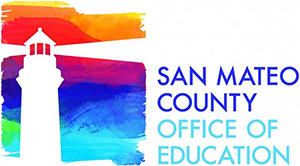
06 Dec2016
By Zachary VanHouten and Aaron Goldstein
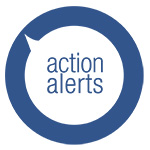
A recording of the November webinar “Advocacy at Your Fingertips: A Review of the New AACTE Advocacy Center” is now available in AACTE’s Resource Library. Viewers will experience a walkthrough of the center’s contents – highlighting specific federal and state resources available to amplify the advocacy skills of AACTE members.
06 Dec2016
By John E. Clark
The views expressed in this article do not necessarily reflect the views of AACTE.
I’m a high school teacher in Florida. I entered the profession through an alternative certification route after completing a 20+ year career in telecommunications. Beyond my standard college classes, my classroom-based preparation consisted of only 10 days of observation along with the creation and delivery of two practice lessons. I graduated as “highly qualified” and was hired immediately as a science teacher at the local teacher job fair.
If I were entering the profession now, especially coming from the business world, I would want a more effective teacher preparation experience than the one I had 10 years ago. Many experienced educators concur. Hope Street Group’s On Deck: Preparing the Next Generation of Teachers (a report released this spring) was the first study that compiled data collected by teachers from classroom teachers regarding their professional preparation. Along with 17 other National Teacher Fellows, I conducted this peer research, sourcing educators of all tenures who were certified in 49 states plus the District of Columbia. Amid several interesting findings in On Deck, two particularly resonated with me as I also reflect on “what I wish I’d learned then.”
06 Dec2016
By Deborah Snyder
AACTE is partnering with the American Association for Employment in Education (AAEE) to increase input from educator preparation providers in the organization’s annual teacher supply and demand survey.
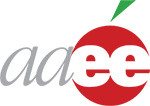
If you haven’t already done so, could you please take 10-15 minutes to complete the 2016-17 AAEE Supply and Demand Survey? You do not need to be a member of AAEE to participate in the survey, and all respondents will receive an executive summary of the results. The survey is open through January 16.
06 Dec2016
By Shelly Furuness
A version of this article also appeared on the Butler University website.
When the federal Department of Education went looking for ideas on how to prepare teachers better, Butler University’s College of Education answered.
After the nationwide call for teacher preparation programs to submit innovative practice ideas with the potential for growth, Butler became the first Indiana school to be invited to present at a Teach to Lead Summit, the goal of which is to develop and amplify the work of teacher leaders. From nearly 100 submissions, 17 teams were invited to the Teacher Preparation Summit, held November 3-4 in Washington, DC. Participants spent 2 days in intensive strategic planning sessions aimed at identifying obstacles and solutions for spreading innovative best practices in teacher preparation across the country.
05 Dec2016
By Aaron Goldstein
Ed Prep Matters is pleased to bring you this special feature on state policy and AACTE state chapter activity. For similar recap articles from earlier months, browse the “State Directions” section of the blog.
Overview of State Policy Activity
During November, many state legislatures continued preparing for the 2017 legislative sessions. Over the past month, Montana, New Hampshire, Nevada, Texas, and Wyoming prefiled bills for 2017 – providing a general preview of legislators’ priorities. Some of the prefiled bills relate to adopting a performance funding system for institutions of higher education, modifying the governance structure of a state’s professional standards commission, requiring the collection of additional information on teachers and paraprofessionals for accountability purposes, and modifying eligibility criteria for a teacher loan program geared to address the teacher shortage.
01 Dec2016
By AACTE
Sharon Robinson, President and CEO of AACTE, issued the following statement today regarding President-Elect Donald J. Trump’s selection of Betsy DeVos to serve as U.S. Secretary of Education:
“AACTE congratulates Betsy DeVos on her nomination. On behalf of the nation’s educator preparation programs, we stand ready to collaborate with her to improve education for every student in America.
01 Dec2016
By Joen Larson
On Election Day, AACTE launched its new Advocacy Center – a one-stop online resource to help guide your federal and state-level advocacy. To that end, you will find handy advocacy guides, state and federal pages with key resources and links, and the opportunity to sign up for a brand-new AACTE Action Alert system.
These alerts are timely, allowing anyone who signs up to participate in e-mail-based advocacy campaigns in support of the profession. We all were reminded of the power of the constituent voice in the recent elections, and we know we need to make our individual voices (and the collective voice of the profession) heard in our states and in Washington, DC, going forward.
01 Dec2016
By Aaron Goldstein
Congratulations to the future members of AACTE’s Board of Directors! In a recent online election, AACTE members and state chapter leaders chose the following colleagues to serve a 3-year term beginning at the conclusion of the March Board meeting:








